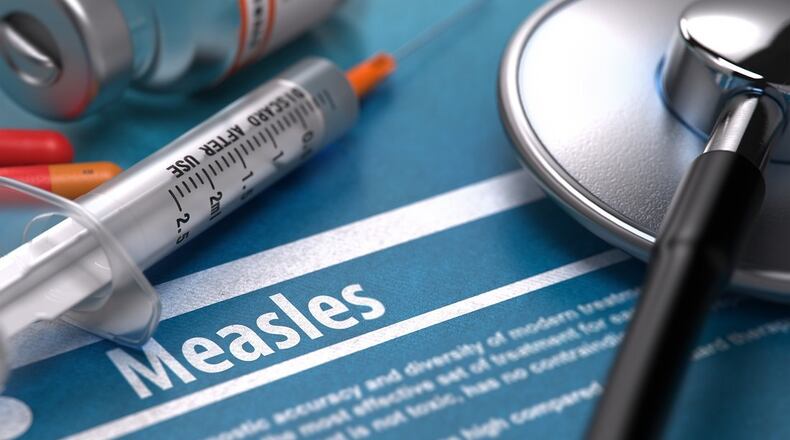Other individuals who were present at the emergency department on March 26 between the hours of 6:58 p.m. and 10:22 p.m., and on March 30 between the hours of 10:30 a.m. and 2:27 p.m. are being contacted by Public Health–Dayton and Montgomery County to assess their measles vaccination status and to provide them with information regarding signs and symptoms of measles and appropriate quarantine measures.
The incubation period of measles from exposure to early stages of the illness averages 11 to 12 days, according to the Centers for Disease Control and Prevention. The time from exposure to rash onset averages 14 days, with a range of seven to 21 days. The early symptoms of the illness lasts two to four days, with a range of one to seven days.
“Measles and mumps cases don’t happen that often,” said Dan Suffoletto, Public Health’s public information manager. Suffoletto said they want health care providers to be aware of these cases in case they come across additional cases. Public Health is also urging parents to make sure their children are up to date on their vaccinations as unvaccinated individuals are at risk of infection and severe disease.
“The safest way to protect children from measles is to make sure they are vaccinated,” said Dr. Becky Thomas, medical director of Public Health. During the pandemic many children may have missed receiving routine vaccinations.
Parents should talk to their child’s doctor to make sure their children have the necessary vaccinations. The Centers for Disease Control and Protection recommends all children get two doses of MMR (measles-mumps-rubella) vaccine, starting with the first dose at 12 through 15 months of age, and the second dose at four through six years of age.
Measles is very contagious, public health officials said. Children infected with measles can spread it to others, even before they have symptoms. The measles virus can live for up to two hours in the air after an infected person leaves the room. Nine out of 10 unvaccinated children who are exposed to the measles will become infected, Public Health said on Friday.
Symptoms of measles can include high fever cough, runny nose, watery eyes and a rash three to five days after other symptoms begin. Measles can be serious, and about one in five children who get measles will be hospitalized with complications such as pneumonia, dehydration, or brain swelling.
In addition, a mumps case has been identified in a Montgomery County resident. The case has been isolated, and all contacts of the case have been notified. Symptoms of mumps can include fever, headache, muscle aches, tiredness, and loss of appetite.
Public Health does not provide treatment for the measles or the mumps. If you are experiencing symptoms of either, contact your health care provider or an urgent care facility as soon as possible. Call the provider before you come to notify them you have a measles or mumps concern.
Vaccination is the best way to protect yourself against the measles or the mumps. If you are unvaccinated, or do not know if you are vaccinated, contact your health care provider. Public health officials say the MMR vaccine is safe and effective with hundreds of millions of doses given. Contact your local pharmacy or healthcare provider to get vaccinated.
In addition, Public Health provides MMR vaccinations at its clinic at located in the Reibold Building, 117 St. Main St. in downtown Dayton. To schedule an appointment, call 937-225-4550.
These separate cases of the measles and mumps come a little over a month after the last measles outbreak in central Ohio near the Columbus area ended in late February with 85 cases of the measles. That outbreak began in early November 2022. For a group of cases to be considered an outbreak, there needs to be three cases that are connected.
About the Author

